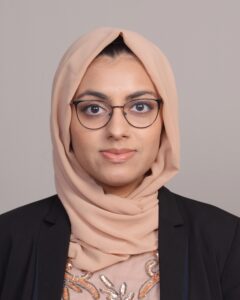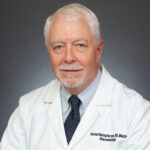
Dr. Qaiser
Some people may think Pakistan and Oklahoma share little in common, but one recent graduate of the rheumatology fellowship program at Louisiana State University, Shreveport (LSUS), School of Medicine disagrees. Iman Qaiser, MD, MBBS, a native of Pakistan who is starting a role as the only rheumatologist serving the Choctaw Nation of Oklahoma, sees natural links between the two locales and is poised to form even more.
Describing her journey from Karachi, Pakistan, to the 11,000-square-mile Choctaw Nation, Dr. Qaiser says, “While in my third year of medical school at Aga Khan University [Karachi], I had a rotation in which I could choose an elective. Rheumatology was not mandatory in our curriculum—and frankly, at that time I didn’t even know what it entailed. I dove into the pediatric rheumatology clinic, however, and was able to work with numerous children who had skin rashes and joint deformities. It was very fulfilling and enlightening.”
Landing in Her Field
Arriving in the U.S. in 2018, Dr. Qaiser undertook an internal medicine residency in Grand Rapids, Mich., at Mercy Health (now known as Trinity Health), a community hospital affiliated with Michigan State University, and then matched into the LSUS rheumatology fellowship program in 2021.
“LSU has three fellows per year,” says Dr. Qaiser, “and there is a huge demand for care, with some patients waiting six months for an initial appointment. We have a lot of uninsured individuals come through a state hospital like ours, and I am humbled to be able to help them.”
Having seen the power of rheumatology to change people’s lives, Dr. Qaiser is extending her reach as part of the ACR Workforce Solutions Committee (see sidebar).
An advocate for participation in her field, Dr. Qaiser says that ACR committee work can yield great things for rheumatology and physicians. “By delving into the inner workings of the field, my colleagues can determine their particular interests and niche,” she says. “This is especially valuable when you are starting out on your career path.”
Extended Reach: Member of the ACR Workforce Solutions Committee
An active member of the ACR, Iman Qaiser, MD, MBBS, is a proud volunteer leader: “I selected the Workforce Solutions Committee because statistics over the next decade are predicting a drastic shortage of rheumatologists,” she says, “with many retiring and some newer graduates opting for more incentivized and procedure-heavy fields.”

Dr. Battafarano
“The ACR Workforce Solutions Committee has multiple projects in the pipeline,” says Daniel F. Battafarano, DO, MACP, MACR, chair of the ACR Workforce Solutions Committee. “We have facilitated some new adult and pediatric rheumatology fellowships in the Northwest and Southern-Central regions of the country, which is helpful for both training and sustaining the workforce in those regions. A revised ACR CareerConnection website has also been implemented and we are populating information for early, mid-career and late-career connections for all ACR and ARP career paths.”
“We have divided the [committee] work among five teams,” says Dr. Qaiser, “with Team 1 focused on increasing fellowship spots, particularly in the Northwest, Southwest and Southern-Central regions. They are also working on retaining more people in academia—because there is a great shortage of rheumatology trainers—but also on sustaining rheumatology care in these underserved areas. At present, we are focusing on the Southern-Central Region, including Arkansas and Oklahoma. Our current areas of interest are launching a pediatric rheumatology fellowship in Arkansas, expanding existing programs, and determining ways to retain rheumatologists in academic and community settings.
“Team 2 is busy with evaluating and enhancing access to care with recruiting strategies. Due to the scarcity of rheumatologists, many patients have no providers anywhere near their homes. We hope to move the needle on recruiting practitioners by marketing the value of rheumatology with an ACR white paper, assessing current providers and recent fellows for priorities in the workplace and establishing a dynamic career ACR website.
“The care providers on Team 3 are working on patient-centered communities and value-based care models. Hopefully, we can facilitate models for value-based rheumatology care networks with lower overall cost but improved overall quality of care. We frequently encounter patients with insurance coverage, and we are approaching insurers to advocate for a more streamlined approach to care—from primary care to rheumatology care to multidisciplinary care—and making insurance coverage more patient friendly.
“Team 4 is focused on developing virtual training modules for primary care doctors, physician assistants and nurse practitioners to be used as practical rheumatology references while seeing a patient in clinic.
“Those on Team 5 are pursuing opportunities to enhance support for research and training. The Rheumatology Research Foundation has worked with the ACR to facilitate and expand the number of training, mentoring and research grants for underserved areas.”
Adds Dr. Battafarano, “Virtual training modules for primary care providers (PCPs) and Grand Rounds are being developed and coordinated to expand the rheumatology provider network and to educate and recruit rheumatology fellows from primary care residencies. Training grants for underserved areas have been expanded for rheumatologists, advanced practice practitioners and for PCPs.
“Finally, a white paper describing the clinical and economic value of rheumatology was just approved by the ACR Board of Directors and will be helpful for both practitioners and healthcare systems to better understand the value of a rheumatologist and rheumatology care for a community.”
Read The Clinical & Economic Value of Rheumatology: An Analysis of Market Supply and Utilization in the United States on the ACR website.
Thinking Outside the Clinic
“Looking out over the next decade,” says Dr. Qaiser, “rheumatology care will be unavailable for some who desperately need it. To fill in the care gap we must establish additional fellowship slots. As one might imagine, this comes down to money. Large hospitals and multidisciplinary clinics often focus on cardiology and surgical specialties, to the detriment of rheumatology.
“In expanding our thinking about the field, it should be noted that rheumatology as a career is especially appropriate for working women and/or young mothers. If we can explore ways to accommodate individuals within the workforce by offering more part-time positions or other incentives, then that could be a fruitful way forward.”
Physician, Mother, Wife
In the wake of COVID-19, many have realized they want a multifaceted life in which career and family time are more in balance. For Dr. Qaiser, this was imperative. “I set out to find a field that fits my needs and those of my family. It was particularly important for me that I be able to care for people who may not have the best access to medicine. During my training in Pakistan, there was an abundance of patients who were underserved. As a result of that educational period, I feel that it is only natural to keep serving these patients,” she says.
Because of its flexibility, rheumatology is an ideal fit. “This is a family friendly field where one can be an active, involved doctor and mom—even if I’m on call, it can be remote,” says. Dr. Qaiser. “There is a set schedule in rheumatology, with a minimum of unpredictability. Rheumatology is also known as the ‘happiest specialty’ in medicine, largely because of the excellent female role models we have in our field. As I am training in a program with female leadership, I look forward to going to work where my female program directors, Samina Hayat, MD, and Sarwat Umer, MD, are perfectly in tune with my responsibilities and needs as a physician, mom and wife, while imparting to me excellent education and a paramount experience. Similarly, our program’s younger female faculty, Madiha Tariq, MD, and Kinza Muzaffar, MD, have embodied how to keep an admirable work-life balance with young children while excelling in [my] career.”
1st Job
“I am excited to go in and have some say in how my clinic will be run. We know that Native Americans have a higher rheumatology burden, and I look forward to seeing how I can help, especially with complex cases,” Dr. Qaiser says.
Logistics also factored into Dr. Qaiser’s decision, and the location of the Choctaw Nation was convenient. “I am on a J-1 visa,” she says, “so I had to apply for a job that sponsors a J-1 visa waiver, which essentially cuts down on the employment options—but provides a great deal of help to underserved areas. While many visa waivers are rural, not all are far from big cities. I will be one-and-a-half hours from Dallas and two-and-a-half hours from Oklahoma City. Dallas is particularly important because my husband is doing a surgical residency there.
“The Conrad 30 waiver program, one of the programs under which J-1 international medical graduates [IMGs] apply for a waiver of the foreign residence requirement, makes it difficult for subspecialists because we are competing with primary care for those 30 spots per state. The reality is that most rural places need more primary care and so every state prefers primary care physicians. Overall, the process is onerous, and I will be advocating for changes that render the visa waiver process easier for IMGs.”
Motto Matters
The Choctaw Nation dovetails nicely with her cultural background, says Dr. Qaiser. “It is a community where family ties are close and enduring, and service to community is the norm. I initially got a sense of this when I went for the interview—everyone was warm and welcoming. Indeed, the logo of the Choctaw Nation reads: Faith, Family, Culture.”
As for what types of conditions she will encounter, Dr. Qaiser knows she will treat a lot of patients with scleroderma. “These people suffer immensely and must contend with skin and organs that tighten up,” she says. “Having had mentors who are part of the Scleroderma Research Consortium, I am confident I will be able to help these patients. Compliance can be problematic [because] patients must undergo an echocardiogram and other tests every six months. Fortunately, the Choctaw Nation has solid access to these and provides transport to patients to mitigate compliance issues.”
But sometimes, patients arrive at a later stage of their illness. “Primary care physicians sometimes attempt to help overwhelmed rheumatologists by not referring too many patients. On occasion that does not go well,” Dr. Qaiser says. “I recall a 40-year-old woman who was vomiting blood, short of breath, had swollen feet and had been trying to get a diagnosis. We did a skin biopsy because she had a small rash and, lo and behold, she had vasculitis. After several infusions, she stopped coughing up blood, her breathing improved, and she no longer required oxygen. It was a complete turnaround. … I am so grateful to be able to help her and other patients in physical and mental distress.”
The Choctaw Nation is the third largest federally recognized tribe in the U.S., with over 200,000 members.2 Now it has an in-house advocate who is ready to say “hello” in the people’s own language—“halito.”
Elizabeth Hofheinz, MPH, MEd, is a freelance medical editor and writer based in the greater New Orleans area.
References
- Upton L, Kilian A. 25 guiding principles for rheumatology trainees. The Rheumatologist. 2020 Jul;14(7):23–25.
- About the Choctaw Nation [Internet]. 2022. https://www.choctawnation.com/about.



